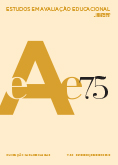Metacognitive strategies: analysis of their impact on writing reviews
DOI:
https://doi.org/10.18222/eae.v0ix.6434Keywords:
Cognitive Psychology, Metacognition, Writing, Teacher TrainingAbstract
The aim of this study was to verify if the learning and use of metacognitive strategies had a positive impact on writing. The theoretical framework adopted was that of Cognitive Psychology, guided by Flavell (1976). Two students of Pedagogy participated in the study, wich employed a qualitative method. The procedures consisted of seven meetings, aiming to: (a) introduce how to write a review and how to use cognitive strategies to do so; (b) write three reviews; (c) collect two self-assessments from the participants; and, (d) interview each student to learn about their writing process. In order to analyze the results, three categories were created (knowledge of the Person, of the Task, and of the Metacognitive Strategies). The results indicated that there was an evolution in the writing, suggesting that metacognitive strategies should be taught during basic education.Downloads
References
ALLAL, L. Pedagogy, didactics and the corregulation of learning: a perspective from the French – language world of educational research. Research in Education, Londres, v. 26, n. 3, p. 329-226, set. 2011.
BAKHTIN, M. Estética da criação verbal. Tradução: Maria E. Galvão Pereira. 3. ed. São Paulo: Martins Fontes, 2000.
BORUCHOVITCH, E. Estratégias de aprendizagem e desempenho escolar: considerações para a prática educacional. Psicologia: Reflexão e Crítica, Porto Alegre, v. 12, n. 2, p. 361-395, 1999.
BROWN, A. L. Metacognitive development and reading. In: SPIRO et al. (org.). Theoretical issues in reading comprehension. Hillsdale, NJ: Lawrence Erlbaum, 1980.
BROWN, A. L. Metacognition, executive control, self-regulation, and other more mysterious mechanisms. In: WEINERT, F. E.; KLUWE, R. (org.). Metacognition, motivation and understanding. Hillsdale, NJ: Lawrence Erlbaum, 1987. p. 65-116.
BROWN, A. L.; BRANSFORD, J.; FERRARA, R.; CAMPIONE, J. C. Learning, remembering and understanding. In: MUSSEN, P. H. (ed.). Handbook of child psychology. New York: John Willy & Sons, 1983. v. III. p. 77-166.
CORTELLA, M. S. Educação, escola e docência: novos tempos, novas atitudes. São Paulo: Cortez, 2014. DEMBO, M. H. Applying educational psychology in the classroom. 3. ed. New York: Longman, 1988.
DEMBO, M. H. Applying educational psychology. 5 ed. New York: Longman, 1994.
FLAVELL, J. H. Metacognitive aspects of problem solving. In: RESNICK, L. B. (ed.). The nature of intelligence. Hillsdale, NJ: Lawrence Erlbaum, 1976. p. 231-235.
FLAVELL, J. H. Metacognition and cognitive monitoring: a new area of cognitive developmental inquiry. American Psychologist, Washington, v. 34, n. 10, p. 906-911, 1979.
FLAVELL, J. H. Cognitive monitoring. In: DICKSON, W. P. (ed.). Children’s oral communication skills. New York: Academic Press, 1981. p. 35-60.
FLAVELL, J. H. Cognitive development. 2. ed. New Jersey: Prentice-Hall, 1985.
FLAVELL, J. H. Speculations about the nature and development of metacognition. In: WEINERT, F. E.; KLUWE, R. (org.). Metacognition, motivation and understanding. Hillsdale, NJ: Lawrence Erlbaum, 1987. p. 21-29.
FLAVELL, J. H.; MILLER, P. H.; MILLER, S. A. Desenvolvimento cognitivo. 3. ed. Porto Alegre: Artes Médicas, 1999.
FLAVELL, J. H.; WELLMAN, H. M. Metamemory. In: KAIL, R. V.; HAGEN, J. W. (org.). Perspectives on the development of memory and cognition. Hillsdale, NJ: Lawrence Erlbaum, 1977. p. 3-33.
FRY, P. S.; LUPART, J. L. Cognitive processes in children‘s learning: practical applications in educational practice and classroom management. Springfield, III: C.C. Thomas, 1986.
LAWSON, M. J. Being executive about metacognition. In: KIRBY, J. R. (ed.). Cognitive strategies and education performance. New York: Academic Press, 1984. p. 89-109.
LEFEBVRE-PINARD, M.; PINARD, A. Understanding and auto-control of cognitive functions: implications for the relationship between cognition and behavior. Internacional Journal of Behavioral Development, Flórida, v. 6, n. 1, p. 15-35, mar. 1983.
LEFEBVRE-PINARD, M.; PINARD, A. Taking charge of one’s cognitive activity: a moderator of competence. In: NEIMARK, E. D.; DE LISI, R.; NEWMAN, J. H. (ed.). Moderators of competence. Hillsdale, NJ: Lawrence Erlbaum, 1985. p. 191-212.
MACHADO, A. R.; LOUSADA, E.; ABREU-TARDELLI, L. S. A. Resenha: leitura e produção de textos técnicos e acadêmicos. São Paulo: Parábola Editorial, 2004.
MOTTA-ROTH, D.; HENDGES, G. H. Produção textual na universidade. São Paulo: Parábola Editorial, 2010.
RIBEIRO, C. Metacognição: um apoio ao processo de aprendizagem. Psicologia: Reflexão e Crítica, Porto Alegre, v. 16, n. 1, p. 109-116, 2003.
VYGOTSKY, L. S. et al. Psicologia e pedagogia 1: bases psicológicas da aprendizagem e do desenvolvimento. 2. ed. Lisboa: Estampa, 1991.
WEINSTEIN, C. E.; MAYER, R. E. The teaching of learning strategies. In: WITTROCK, M. (ed.). Handbook of research on teaching. New York: Macmillan, 1985.
Downloads
Published
How to Cite
Issue
Section
License
Copyright (c) 2019 Estudos em Avaliação Educacional

This work is licensed under a Creative Commons Attribution-NonCommercial 4.0 International License.
Authors who publish in this journal agree to the following terms:
a. Authors retain the copyright and grant the journal the right to first publication, with the paper simultaneously licensed under the Creative Commons Attribution License (CC BY 4.0) license that allows the sharing of the paper with acknowledgment of authorship and initial publication in this journal.
b. Authors are authorized to assume additional contracts separately, for non-exclusive distribution of the version of the paper published in this journal (for example publishing in institutional repository or as a book chapter), with acknowledgment of authorship and initial publication in this journal.
c. Authors are allowed and encouraged to publish and distribute their paper on-line (for example in institutional repositories or on their personal page) at any moment before or during the editorial process, as this can generate productive changes, as well as increase the impact and citation of the published paper (See The Effect of Open Access).







